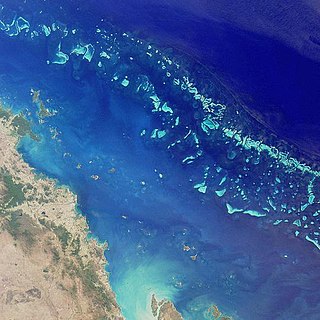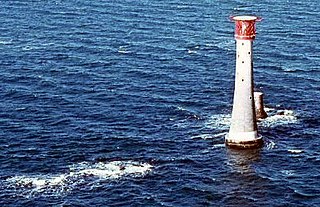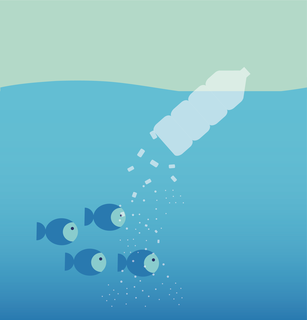Related Research Articles

Mariculture or marine farming is a specialized branch of aquaculture involving the cultivation of marine organisms for food and other animal products, in enclosed sections of the open ocean, fish farms built on littoral waters, or in artificial tanks, ponds or raceways which are filled with seawater. An example of the latter is the farming of marine fish, including finfish and shellfish like prawns, or oysters and seaweed in saltwater ponds. Non-food products produced by mariculture include: fish meal, nutrient agar, jewellery, and cosmetics.

Marine biology is the scientific study of the biology of marine life, organisms in the sea. Given that in biology many phyla, families and genera have some species that live in the sea and others that live on land, marine biology classifies species based on the environment rather than on taxonomy.

Shellfish is a colloquial and fisheries term for exoskeleton-bearing aquatic invertebrates used as food, including various species of molluscs, crustaceans, and echinoderms. Although most kinds of shellfish are harvested from saltwater environments, some are found in freshwater. In addition, a few species of land crabs are eaten, for example Cardisoma guanhumi in the Caribbean. Shellfish are among the most common food allergens.

The Great Barrier Reef is the world's largest coral reef system composed of over 2,900 individual reefs and 900 islands stretching for over 2,300 kilometres (1,400 mi) over an area of approximately 344,400 square kilometres (133,000 sq mi). The reef is located in the Coral Sea, off the coast of Queensland, Australia, separated from the coast by a channel 100 miles wide in places and over 200 feet deep. The Great Barrier Reef can be seen from outer space and is the world's biggest single structure made by living organisms. This reef structure is composed of and built by billions of tiny organisms, known as coral polyps. It supports a wide diversity of life and was selected as a World Heritage Site in 1981. CNN labelled it one of the seven natural wonders of the world in 1997. Australian World Heritage places included it in its list in 2007. The Queensland National Trust named it a state icon of Queensland in 2006.

Conservation in Australia is an issue of state and federal policy. Australia is one of the most biologically diverse countries in the world, with a large portion of species endemic to Australia. Preserving this wealth of biodiversity is important for future generations.

The Coral Sea is a marginal sea of the South Pacific off the northeast coast of Australia, and classified as an interim Australian bioregion. The Coral Sea extends 2,000 kilometres (1,200 mi) down the Australian northeast coast. The sea was the location for the Battle of the Coral Sea, a major confrontation during World War II between the navies of the Empire of Japan, and the United States and Australia.

The Eddystone or Eddystone Rocks are a seaswept and eroded group of rocks ranging 9 miles (14 km) southwest of Rame Head in Cornwall, England, United Kingdom. Although the nearest point on the mainland to the Eddystone is in Cornwall, the rocks fall within the city limits of Plymouth, and hence within the county of Devon.

Marine pollution occurs when substances used or spread by humans, such as industrial, agricultural and residential waste, particles, noise, excess carbon dioxide or invasive organisms enter the ocean and cause harmful effects there. The majority of this waste (80%) comes from land-based activity, although marine transportation significantly contributes as well. Since most inputs come from land, either via the rivers, sewage or the atmosphere, it means that continental shelves are more vulnerable to pollution. Air pollution is also a contributing factor by carrying off iron, carbonic acid, nitrogen, silicon, sulfur, pesticides or dust particles into the ocean. The pollution often comes from nonpoint sources such as agricultural runoff, wind-blown debris, and dust. These nonpoint sources are largely due to runoff that enters the ocean through rivers, but wind-blown debris and dust can also play a role, as these pollutants can settle into waterways and oceans. Pathways of pollution include direct discharge, land runoff, ship pollution, atmospheric pollution and, potentially, deep sea mining.

Marine conservation, also known as ocean conservation, is the protection and preservation of ecosystems in oceans and seas through planned management in order to prevent the over-exploitation of these marine resources. Marine conservation is informed by the study of marine plants and animal resources and ecosystem functions and is driven by response to the manifested negative effects seen in the environment such as species loss, habitat degradation and changes in ecosystem functions and focuses on limiting human-caused damage to marine ecosystems, restoring damaged marine ecosystems, and preserving vulnerable species and ecosystems of the marine life. Marine conservation is a relatively new discipline which has developed as a response to biological issues such as extinction and marine habitats change.

Jean-Michel Cousteau is a French oceanographic explorer, environmentalist, educator, and film producer. The first son of ocean explorer Jacques Cousteau, he is the father of Fabien Cousteau and Céline Cousteau.

The Great Barrier Reef is the world's largest reef systems, stretching along the East coast of Australia from the northern tip down to the town of Bundaberg, is composed of roughly 2,900 individual reefs and 940 islands and cays that stretch for 2,300 kilometres (1,616 mi) and cover an area of approximately 344,400 square kilometres (133,000 sq mi). The reef is located in the Coral Sea, off the coast of Queensland in northeast Australia. A large part of the reef is protected by the Great Barrier Reef Marine Park.
Heroes of the Environment is a list published in Time Magazine. The inaugural list was published in October 2007. The list contains 43 entries, individuals or groups that have contributed substantially to the preservation of environment, and is divided into four categories: Leaders & Visionaries, Activists, Scientists & Innovators, and Moguls & Entrepreneurs.

Zalul Environmental Association is an Israel-based environmental group founded in 1999 with the goal protecting the seas and rivers of Israel through conservation, activism, research, awareness-raising and education. Zalul seeks to put a stop to the spillage of sewage and other toxic waste into Israel's rivers through legal and legislative reforms.
Heroes of the Environment was a list of a year's most notable environmentalists chosen and compiled by Time magazine.

Aquaculture started to take off in New Zealand in the 1980s. It is dominated by mussels, oysters and salmon. In 2007, aquaculture generated about NZ$360 million in sales on an area of 7,700 hectares. $240 million was earned in exports.

Aquaculture in Australia is the country's fastest growing primary industry, accounting for 34% of the total gross value of production of seafood. 10 species of fish are farmed in Australia, and production is dominated by southern bluefin tuna, Atlantic salmon and barramundi. Mud crabs have also been cultivated in Australia for many years, sometimes leading to over-exploitation. Traditionally, this aquaculture was limited to pearls, but since the early 1970s, there has been significant research and commercial development of other forms of aquaculture, including finfish, crustaceans, and molluscs.

Recreational dive sites are specific places that recreational scuba divers go to enjoy the underwater environment or for training purposes. They include technical diving sites beyond the range generally accepted for recreational diving. In this context all diving done for recreational purposes is included. Professional diving tends to be done where the job is, and with the exception of diver training and leading groups of recreational divers, does not generally occur at specific sites chosen for their easy access, pleasant conditions or interesting features.

Morris Kahn is an Israeli billionaire entrepreneur. He is the founder of Golden Pages Israel, Amdocs, the Aurec Group, Coral World and other companies. Through Coral World, he founded several marine parks around the world, including an underwater observatory in Eilat, Israel. As of March 2022, his net worth is estimated at US$1.0 billion.
Felicity Jane "Flic" Wishart was an Australian conservationist and environmental activist.

The environmental impact of recreational diving is the effects of recreational scuba diving on the underwater environment, which is largely the effects of diving tourism on the marine environment. It is not uncommon for highly trafficked dive destinations to have more adverse effects with visible signs of diving's negative impacts due in large part to divers who have not been trained to sufficient competence in the skills required for the local environment, an inadequate pre-dive orientation, or lack of a basic understanding of biodiversity and the delicate balance of aquatic ecosystems. There may also be indirect positive effects as the environment is recognised by the local communities to be worth more in good condition than degraded by inappropriate use, and conservation efforts get support from dive communities who promote environmental awareness, and teach low impact diving and the importance of respecting marine life. There are also global coral reef monitoring networks in place which include local volunteer divers assisting in the collection of data for scientific monitoring of coral reef systems, which may eventually have a net positive impact on the environment.
References
- 1 2 Ben-Tal, Daniel; Press, Rory (3 August 2007). "A Clear Vision". The Jerusalem Post . ProQuest 319626364.
- 1 2 "Benjmin Kahn - Heroes of the Environment". Time . October 2007. Retrieved 24 October 2007.
- ↑ Brinn, David (24 October 2007). "Israeli activist named one of Time's 'Heroes of the Environment'". israel21c.org. Retrieved 10 May 2018.
- 1 2 3 "Israeli tech chosen to kill off invasive mussel species at Hoover Dam". The Times of Israel. 14 September 2017. Retrieved 26 April 2018.
- ↑ Rinat, Zafrir (8 June 2008). "Gideon Ezra and Greens Exchange Potshots Over Kishon Stream". Haaretz . Retrieved 26 April 2018.
- ↑ Shamah, David (16 February 2013). "Israeli water tech draws new European investment". The Times of Israel . Retrieved 26 April 2018.
- ↑ Bloomberg: Benjamin Kahn